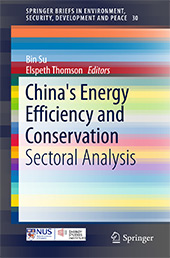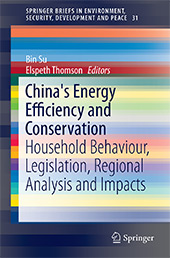|
|
| |
|
| |


SpringerBriefs in
Environment, Security, Development and Peace (ESDP)
A Peer-reviewed Book Series
Edited by
Hans Günter Brauch,
AFES-PRESS, chairman
Free University of Berlin (Ret.)
 |
Su Bin, Elspeth Thomson (Eds.): Opportunities and Challenges in China’s Energy Development. Springer Briefs in Environment, Security, Development and Peace, vol. 30 (Cham – New York – Heidelberg – Dordrecht – London: Springer International Publishing, 2016).
ISBN (Print): 978-3-319- 978-981-10-0735-4
ISBN (Online/eBook): 978-981-10-0737-8
DOI: 10.1007/978-3-319-24496-9 978-981-10-0737-8
Order this book on the Springer Website |
| |
|
 |
Su Bin, Elspeth Thomson (Eds.): China's Energy Efficiency and Conservation: Household Behaviour, Legislation, Regional Analysis and Impacts . Springer Briefs in Environment, Security, Development and Peace, vol. 31 (Cham – New York – Heidelberg – Dordrecht – London: Springer International Publishing, 2016).
ISBN (Print): 978-3-319- 978-981-10-0735-4
ISBN (Online/eBook): 978-981-10-0737-8
DOI: 10.1007/978-3-319-24496-9 978-981-10-0737-8
Order this book on the Springer Website
|
| |
|
|
On the book
China, with the largest markets and manufacturing factories in the world, plays an important role in global energy use and carbon emissions. China has made remarkable economic progress over the last decade, resulting in a sharp increase in its overall energy use and GHG emissions. In 2007, China overtook the United States as the world’s largest emitter of CO2 emissions. As many countries, international organisations and research institutes have realised the importance of understanding China’s contributions to the world, a large number of studies on China’s energy and emissions issues have been made over the last decade.
In China’s 12th Five-Year Plan, the central government set a 16 per cent reduction target for national energy intensity and a 17 per cent reduction target for carbon intensity. On 25 January 2013, China’s State Council further announced the “12th Five-Year Plan for Energy Development”. The plan summarises China’s major achievements in energy development in the 11th FYP period (2006–10), and clarifies national energy policy priorities through an ambitious set of infrastructure and market targets in the 12th FYP period (2011–15). It also serves as a useful basis to benchmark China’s progress in the energy space.
This officially released energy development plan not only identifies various aspects of energy challenges faced by the Chinese central/local governments, but also provides an opportunity to study how best to achieve green growth and a low-carbon transition in a developing country like China. The progress of China’s carbon mitigation policies also has significant impacts on the ongoing international climate change negotiations. Therefore, both policy-makers and decision-makers in China and other countries can benefit from studying the challenges and opportunities in China’s energy development.
On the Editors
 |
Dr SU Bin (B. Su) is Senior Fellow at the Energy Studies Institute (ESI) in the National University of Singapore. He is now leading ESI’s energy modelling programme, and actively involved in many energy modelling related projects commissioned by government agencies. He received his PhD in Industrial and Systems Engineering from the National University of Singapore, and Master’s degree in Probability Theory and Mathematical Statistics from the Academy of Mathematics and Systems Science at the Chinese Academy of Sciences. His main research interest is energy and environmental systems modelling and analysis, with a particular emphasis on energy efficiency, climate change, embodied energy/emissions, benchmarking, carbon footprint, carbon-pricing and emissions trading. Dr Su is presently an Associate Editor for Energy Economics, an Editorial Board Member of Reports on Economics and Finance, and a referee for more than 30 international peer-reviewed journals. To date, he has published over 20 papers on energy and environmental issues in international peer-reviewed journals. For his complete list of publications, see Dr Su’s profile at the ESI website. |
| |
|
|
Dr Elspeth Thomson is a consultant for ESI, and is presently based in Canada. She received her PhD from the School of Oriental and African Studies, at the University of London. Her research interests span Asian energy security, energy economics and energy and the environment. Besides her book tracing the history of China’s coal industry, and several edited collections, she has published numerous articles and book chapters on many aspects of the various types of energy produced, consumed and traded in Southeast, North and South Asia.
Through the 1990s, she taught at Simon Fraser University in Vancouver and Lingnan University in Hong Kong. From 2001–07, she was a Research Fellow at the East Asian Institute at NUS where she was a China energy specialist, and from 2007–15, she was Senior Fellow and Head of the Environment Division at ESI. Some of her major publications include:
- “Introduction to Special Section: China Energy Issues in the 12th Five Year Plan and Beyond”, Energy Policy 73 (June 2014): 1–3.
- “The Role of Oil and Gas in China’s Energy Strategy: An Overview”, (with Augustin Boey) Asia Pacific Business Review 24, (August 2014): 1–16.
- “Asia’s and Europe’s Energy Policy Challenges: Introduction” (with Christopher Dent), Asia Europe Journal 11, 3 (2013): 201–10.
- “Asia and European Transport Biofuels Stalled at the Same Place?” (with Kamal Soundararajan) , Asia Europe Journal 11, 3 (2013): 247–63.
- “China’s Nuclear Energy in Light of the Disaster in Japan”, Eurasian Geography and Economics 52, 4 (2011): 464–82.
- “The Role of Coal in the Development of the Baltic and South China Sea Regions”, (with Krish Booluck) Asia Europe Journal 8, 3 (2010): 399–412.
- “China’s Energy Security: Challenges and Priorities”, (with Nobuhiro Horii) Eurasian Geography and Economics 50, 6 (Nov/Dec 2009): 643–64.
- “The Development of Biofuels in Asia”, (Adrian Zhou) Applied Energy 86, Supplement 1 (November 2009): S11–S20.
- “China’s Coal Industry”, in Encyclopaedia of Modern China, 1st Edition, ed. David Pong (Detroit, MI: Charles Scriber’s Sons, 2009).
- “ASEAN and Northeast Asian Energy Security: Cooperation or Competition?”, East Asia: An International Quarterly 23, 3 (Winter 2006): 67–90.
- “The Unocal Bid and Free-market Principles”, Perspectives 6, 4 (Dec. 2005).
- “Power Shortages in China: Why?”, China: An International Journal 3, 1 (March 2005): 155–71.
|

|
 
Energy Studies Institute
Since its establishment in November 2007, the Energy Studies Institute (ESI) is well on its way towards becoming a presence in the international energy policy research arena. For instance, in the 2014 Global Go To Think Tanks Index Report by the University of Pennsylvania Think Tank and Civil Societies Program, ESI was listed as among the Top 10 Energy and Resource Policy Think Tanks.
ESI provides timely and quality analyses in an evolving energy research landscape influenced by regional and global events. As a leading energy and resource policy think tank, ESI is committed to leveraging the best resources, methods and tools to carry out policy-related energy research and to raise public awareness. ESI’s research has been published in key internationally refereed journals and other publications which includes the ESI Bulletin that is widely read. The researchers at ESI often write newspaper commentaries and appear on television interviews.
As of 2016, ESI has six research tracks: Energy & Climate Change; Energy Efficiency & Conservation; Energy for Power Generation; Energy for Transport; Energy Geopolitics; and Energy & Economic Competitiveness. The Institute runs the Asia–Europe Energy Policy Research Network (AEEPRN), as well as spearheads programmes in Energy Modelling, Gas, Maritime Studies, and Nuclear Energy.
ESI activities
As a thought leader, ESI frequently organises activities that include international conferences and seminars in the areas of energy economics, energy and the environment, and energy security. Its events are organised jointly with other think tanks, government agencies and industries. ESI’s activities include the following:
-
Academic research and energy studies commissioned by the public, private agencies and industry
-
Public outreach programmes
-
Participation in the Singapore International Energy Week and local and overseas energy-related events
-
Conducting of research seminars, and the organising of international conferences, workshops, and capacity-building programmes
Collaborators and Research Sponsors
Since 2007, ESI has worked with various state and non-state actors such as the following:
-
(Singapore government and its agencies) Ministry of Trade and Industry, Ministry of the Environment and Water Resources, Ministry of Foreign Affairs, National Climate Change Secretariat, National Environment Agency, Building and Construction Authority, Energy Markey Authority, and the Land Transport Authority.
-
United Nations Economic and Social Commission for Asia and the Pacific, Asia-Pacific Economic Cooperation, Economic Research Institute for ASEAN and East Asia, and the Centre for Non-Traditional Security Studies, S. Rajaratnam School of International Studies, Nanyang Technological University
Please visit ESI at: <http://www.esi.nus.edu.sg/>.
|
|
|